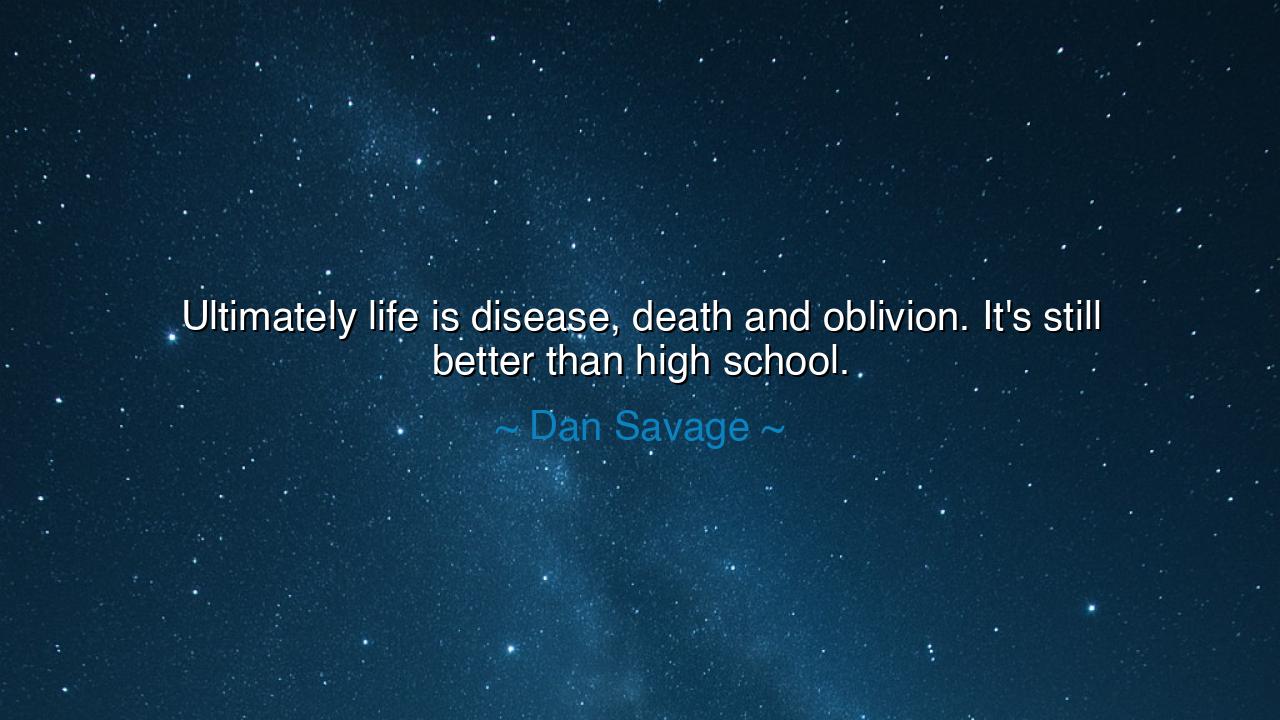
Ultimately life is disease, death and oblivion. It's still better






“Ultimately life is disease, death and oblivion. It’s still better than high school.” — Dan Savage
In these words, Dan Savage, the sharp-tongued humorist and moralist of the modern age, speaks with jest, yet beneath the laughter lies profound truth. The quote may sound like mockery, but it is a mirror reflecting both the sorrow and the resilience of the human spirit. It is a truth born of irony — that even though life ends in suffering and silence, it remains precious, even glorious, when compared to the cruelty of ignorance, conformity, and the smallness of spirit that so often thrive in the closed halls of human judgment.
When Savage speaks of life as “disease, death, and oblivion,” he does not revel in despair — he is naming the reality that all mortals must face. Our bodies decay; our days are finite; the universe forgets us in time. These are the laws of nature, inescapable and indifferent. Yet, in the second half of his statement, the tone shifts: “It’s still better than high school.” This is not merely a joke — it is a revelation. He reminds us that, even within a fleeting and flawed existence, there is freedom and possibility. What makes life worthwhile is not its permanence, but its capacity for growth, for meaning, for becoming more than what we were when we began.
High school, in his metaphor, stands for a world of fear, conformity, and cruelty — that small stage of life where people judge before they understand, where the soul hides behind masks of acceptance. In every generation, high school becomes a symbol of the pain of belonging, the struggle between individuality and conformity. For many, it is the first battlefield of identity, where mockery wounds deeper than swords and silence becomes the armor of survival. Savage’s words, born of his own experiences as a gay man growing up in an unkind age, carry the defiance of one who endured such scorn and rose beyond it.
The ancients, too, knew this journey. Consider Socrates, mocked and condemned by the very city he sought to enlighten. His Athens was his “high school,” a place where truth was met with ridicule and virtue with suspicion. Yet Socrates, rather than despair, chose to drink the hemlock with serenity, teaching his followers that it is better to die for truth than to live enslaved by falsehood. Savage’s jest, though wrapped in humor, carries the same defiance: better the harsh truth of life than the soft cruelty of conformity.
To call life “better” — even with its disease, death, and oblivion — is to proclaim faith in its beauty despite its brevity. It is to say that freedom, even fragile and fleeting, is worth more than the comfort of imprisonment. Savage, through irony, delivers a lesson in resilience: that those who survive ridicule, rejection, and pain in their youth often emerge with a strength forged by fire. To live freely — to be oneself — is a victory greater than immortality itself.
There is also humor as wisdom in his words. The wise know that laughter is a shield against despair. The ancients laughed at death through myth; the philosophers smiled at their own mortality, knowing that laughter, not fear, is the truest rebellion. By ending his grim description of life with a punchline, Savage reclaims power from the darkness. He teaches that the spirit can endure anything — so long as it does not lose its sense of humor.
So let this saying be remembered as both jest and teaching: life will wound you, but it will also free you. The world may be unkind, but beyond its cruelty lies a vastness of possibility. Cherish your scars; they prove you have lived. Laugh at the absurdity of it all, for laughter is the song of survival. And when you are tempted to despair, remember Savage’s truth — that even a world destined for oblivion is better than one without growth, courage, or selfhood. For the soul that endures mockery and rises laughing has already conquered death itself.






AAdministratorAdministrator
Welcome, honored guests. Please leave a comment, we will respond soon